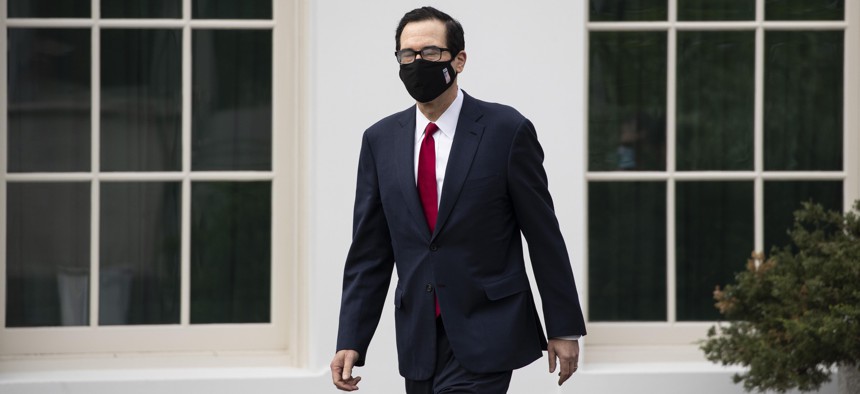White House Open to Loosening Rules for State and Local Aid Funds, Mnuchin Says

Treasury Secretary Steven Mnuchin wears a mask as he walks on the grounds of the White House, Thursday, May 14, 2020, in Washington. AP Photo/Alex Brandon

Connecting state and local government leaders
The Treasury Secretary also clashed with Sen. Sherrod Brown over how well-prepared the nation is currently to limit coronavirus risks as the economy begins to reopen.
The Trump administration is open to granting states, counties and cities more flexibility in how they can use $139 billion in previously approved coronavirus relief funding, Treasury Secretary Steven Mnuchin said on Tuesday.
“If there is bipartisan support for this and the money has already been allocated, that is something that I assume we'd very seriously go along with,” Mnuchin said during testimony before the Senate Banking Committee, in response to a question about allowing states to use the money to fill budget shortfalls caused by the virus-driven economic slump and the massive dent it has put in state and local tax revenues.
“But again there has to be broad bipartisan support,” he emphasized.
Mnuchin also warned that the risk of “permanent damage” to the economy would increase the longer that sweeping business closures and other restrictions to contain the virus remain in effect. “It is so important to begin bringing people back to work,” he said.
“We're conscious of the health issues and we want to do this in a balanced and safe way,” Mnuchin added.
But Sen. Sherrod Brown, of Ohio, the top Democrat on the committee, pointedly questioned Mnuchin on this point, arguing it isn’t safe to reopen parts of the economy until more protections are in place to control the spread of the virus, and criticizing the Trump administration for not doing enough on this front.
“You’re pushing people back into the workplace, there’s been no national program to provide worker safety,” Brown said to Mnuchin.
“How many workers should give their lives to increase the GDP or the Dow Jones?” he added.
“No workers should give their lives to do that,” Mnuchin shot back. He said that the White House did not intend to send people back to work without adequate protections.
Congress allotted the state and local aid that Mnuchin referred to in a special fund that was part of the “CARES Act”—the huge coronavirus relief package President Trump signed into law in March.
The law, and subsequent Treasury Department guidance, restricts states and the larger-sized localities that are eligible for this pot of money from using it to freely backfill lost tax revenues. Instead, it has to be used for certain expenditures with links to the virus response.
Many state and local officials have argued that they should have greater leeway to use the money to offset lost revenues.
The Democratic-controlled House passed a new coronavirus relief measure last week that would relax limits on how the funding could be used. That bill also includes upwards of $900 billion in new aid for state and local governments.
But the chances that the Republican-controlled Senate will take up and pass this bill as is are scant. And Republicans in general have been more skeptical than Democrats about the idea of moving aggressively to provide more financial aid to states and local governments.
Mnuchin made his comment about the CARES Act relief fund in response to a question from Sen. John Kennedy, a Louisiana Republican who is backing a bill that would allow state and local governments to tap the relief fund for operating expenses unrelated to the coronavirus.
Louisiana's economy and state finances are getting battered by sharp drops in tourism and the oil sector, both key industries for the state.
“We may not be able to pass another bill,” Kennedy said.
“Why would we not allow states, without appropriating any new money, to use that money to address revenue shortfalls?” he asked.
Kennedy’s bill would restrict the funding from going to public pension funds. This issue became a flashpoint after Illinois state lawmakers suggested that the state could use billions of dollars in federal aid to shore up its troubled pensions for public employees.
Mnuchin said that he believed he and Kennedy had a call scheduled for later in the day on Tuesday, after the hearing, and that they could talk more about the senator’s bill at that time.
Federal Reserve Chairman Jerome Powell, who also testified at Tuesday’s hearing, discussed a $500 billion lending program that is meant to help states and larger-sized local governments meet their short-term credit and cash flow needs amid the public health crisis.
He said that the Municipal Liquidity Facility overseen by the Fed is probably about 10 days to two weeks from being operational and that the central bank was looking at ways to possibly open it up to some additional local government borrowers in states where no cities or counties meet the current population thresholds to qualify for the program.
Powell also noted that states have the ability to borrow through the program and then funnel money to localities within their borders.
The Fed chairman for the most part tiptoed around questions about how Congress should proceed with further relief legislation, but said the measures passed so far were both "timely and forceful."
“I do think we need to take a step back and ask, over time: Is it enough? And we need to be prepared to act further," he said.
“I think we're going to see here fairly quickly how the reopening goes,” Powell added. “It's very hard to know, we haven't done this thing before. No one's done this sort of thing before.”
Bill Lucia is a senior reporter for Route Fifty and is based in Olympia, Washington.

NEXT STORY: We Can Prevent a Great Depression. It’ll Take $10 Trillion.





